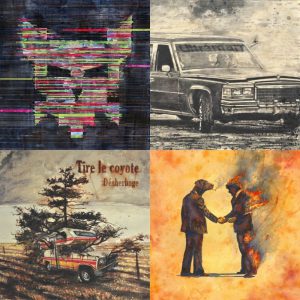Through our new series of stories, Visual Arts X Music, we aim to present you with visual artists for whom music plays an essential role, in both their artistic approach, and their lives.
“I have the distinction of being the first drummer ever fired by Fred Fortin,” jokes visual artist Martin Bureau, who’s created the covers of every album for the father of the so-called “Lac-Saint-Jean sound” since Joseph Antoine Frédéric Fortin Perron – a 1996 album with a mouthful of a title that Bureau quotes flawlessly. Impressive. “It’s easy for me to remember because I know both the Fortins and the Perrons,” he says.
Bureau and Fortin met in Saint-Félicien, in Québec’s Lac-Saint-Jean region, at the Polyvalente des Quatre-Vents school back in the mid-1980s. “We lived in the same neighbourhood, and started playing music together,” he says. Bureau was playing drums at the time – “the drummer of Fred’s father’s band had sold me my first drum set when I was 14 or 15” – and Fred was playing bass, which has remained his main instrument. “Right from secondary school, Fred stood out,” Bureau recalls. “His talent was out of this world.”
Because he couldn’t say as much about his own personal performance behind the drums, Bureau soon turned to photography and painting. It was only natural that he’d end up helping his pal establish his visual identity, down the line. “It happened naturally,” says Bureau. “In his early twenties, Fred put out a recording, and I’d just received my Bachelor of Fine Arts degree. That we would end up working together was a foregone conclusion.”
While the cover of Fred Fortin’s debut album shows a rather classical picture of the musician, Bureau has created each of the singer’s following emblematic, naturalistic, and dream-like album covers since Plancher des vaches in 2000. “Back in those days, labels always wanted to see the singer’s face on the album cover,” the painter says, as he was looks at the first Gros Méné (1999) cover, which showed a much greater artistic freedom in spite of the fact that it used a photograph and not a painting. “The Tue ce drum Pierre Bouchard album cover reflected what we were doing at the time, which was playing hockey outside,” he says. “I had this black and white lab photo, and I was still honing my Photoshop abilities.”
The record company La Tribu, for whom Fortin recorded his sophomore album, gave free visual rein to Bureau. The label would also initiate a series of meetings between visual artists and musicians, on the initiative of the its co-founder Suzie Larivée, a visual arts enthusiast. Bureau ended up collaborating with, among others, Galaxie, Stephen Faulkner, and more recently, singer-songwriter Tire le coyote – who had him design all of his album covers from Mitan (2013) on.

Bureau’s work as an album cover designer also helped him get work as a photographer, and later, as a music video producer – thanks to a series of happy accidents that caused him to tackle documentary production from 2008 on. His 2015 L’Enfer marche au gaz! sheds a harsh light on the environment of stock car races in Saint-Félicien’s Autodrome.
As for the Bureau/Fortin modus operandi, Fortin usually pays a visit to Bureau in his Québec City studio, and reviews the works his old chum has produced over the last few years. “We look at some 40 to 50 paintings while listening to the new album, and we end up saying, ‘This one could be a fit,’” says Bureau. Fred will sometimes go as far as borrowing one of Bureau’s painting titles outright, as he did for the Planter le décor (2004) album.
A rare departure from their strategy, Microdose is a buzzing lysergic misdemeanor from 2009. “Fred was telling me that he was having fun pretending that he was Pink Floyd while he was writing and recording, and I came up with the idea of creating a Wish You Were Here pastiche because his female dog Wendy had just died,” says Bureau. In death, she replaced Syd Barrett. “It’s a huge reference, but there still will be people calling us copy cats on Facebook,” Bureau jokes.
Is he still playing drums? Not really. “I used to have a routine of coming home for lunch before going back to the studio, and, as I was getting sleepy, I would play some drums before going back to my paintings.” he says. The playlist included Godspeed You! Black Emperor, The Black Crowes, and Jóhann Jóhannsson.
Final question: Will this 25-year-old collaboration end up lasting a lifetime? “I used to tell Fred, ‘Go ahead, try using someone else. Have fun,’ Today, however, I no longer feel that way. The fact that we’re still doing this thing together after 25 years is huge,” says the artist. All the more so because this continuity has helped consolidate Fred Fortin’s monumental life work. Just listen to Scotch, and you’ll automatically recall the orange end-of-the-world hues. Or remember the sickly trees and the cranes of the Planter le décor album cover when you hear the music. “I’m glad to hear this because I, too, love thinking about my favourite bands, and lots of images re-surface in my mind.”